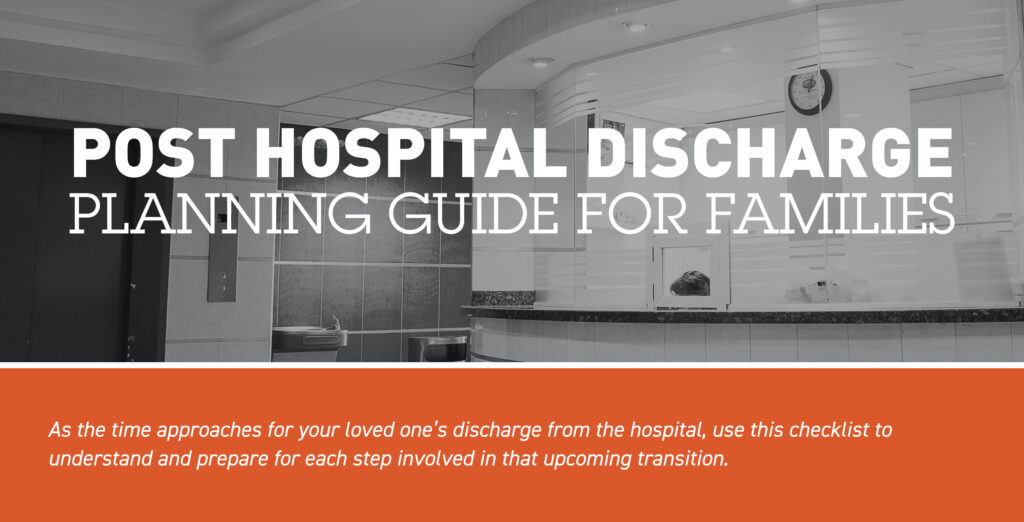Planning for a loved one’s discharge from the hospital may feel overwhelming just after surgery or in the midst of treatment. However, an early start will help prevent added stress for the whole family when the discharge date arrives.
Here we share information and resources on what to expect from the discharge process and how to prepare for it.
What is Hospital Discharge Planning?
Discharge planning makes for a smooth transition out of the hospital. Medicare defines it as “the process that determines the type of care you need after you leave the hospital.”
Hospitals help families through the discharge process by collecting input from the patient’s doctors and caregivers and then delivering a written discharge plan that includes:
- Types of care needed.
- Where care should be given. (This is usually a post hospital care facility or care at home. Both offer around the clock care and/or rehabilitation.)
- List of medications and dosing guidelines.
- Education and training about how to care for the patient.
Families have rights in this process including information about the discharge date and participation in decision making.
My Mom is Being Discharged This Week, What Do I Do?
Step 1: Start by asking the hospital to connect you with the discharge planner. Schedule time to speak with that person right away.
Step 2: Find out what kind of post hospital care is needed. An elderly parent may require some time in a post acute care facility, where staff with skilled nursing services can look after them. After that they may transition into assisted living or return home, depending on their needs. It helps to understand what kind of care your parent is likely to need initially and later on.
Step 3: Next, check with different types of payor sources to find out what services they cover at these facilities.
Ask questions throughout the process. It can help to use checklists to ensure all important points are addressed. Take notes, as the answers might be complex and it can be helpful to refer back.
Step 4: Once you know the level of care needed, thoroughly research facility options near you. Though the hospital may provide you with a list of facilities, you’ll want to evaluate them for yourself. Here we provide a checklist of what to look for and questions you should ask.
Senior Living Options After Post Hospital Care
After hospitalization or a stay at a post acute care facility, families face the tough decision about where an aging loved one should receive continued care. Here we examine two options, assisted living and home health care.
Assisted Living
Assisted living allows residents to transition easily when their care needs increase. Daily activities like rehab can feel less disruptive if they happen just down the hall, staffed by people that they know.
Marquis’ campuses offer both post hospital care and assisted living facilities. Families can feel secure that elderly parents will transition smoothly between different levels of care.
Home Health Care and Care at Home
Alternately, the patient may return home for continuing care. This can be challenging for family caregivers, so it’s a good idea to be honest about any physical, emotional, financial, and scheduling limitations.
Referrals from the hospital can offer help, but think seriously about preparedness before bringing a loved one home after a hospital stay. Many home services require out-of-pocket payment, so research all of your coverage options.
Navigating the financial landscape of these types of care can be confusing. Below is a brief overview of the two:
Home health care (nursing care, physical therapy, occupational therapy, etc.) is generally paid for by Medicare or insurance. This type of care has to be ordered by a doctor and is not usually paid for by private insurance companies due to its expense.
Home care/care at home (companion care, running errands, helping around the house, etc.) is generally paid privately, out-of-pocket.
Marquis offers AgeRight at Home care after hospitalization. Services range from occasional rehab visits to 24 hour caregiving in the patient’s home.
Marquis’ Care Options for Your Senior Loved One
Marquis is a family-owned company that has provided innovative continual care for our residents and patients for over 30 years. As the needs and abilities of your senior loved one change, we are able to provide the clinical expertise they need during every stage of their aging journey.
Contact Marquis today to discuss this and other post hospital care options for your loved one.
